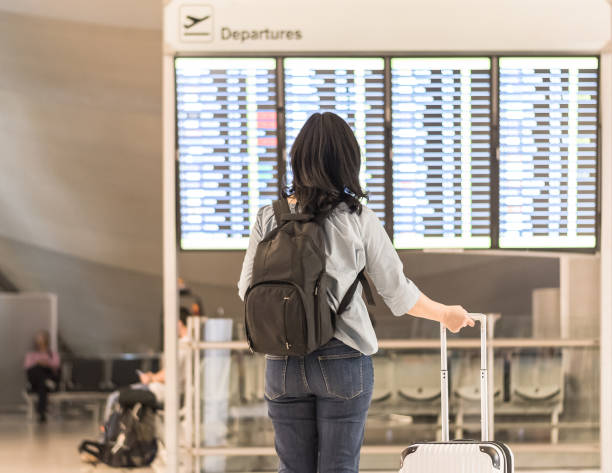What To Expect When You Fly During COVID-19? | Flightlayaway
Do you remember when you were a kid, and your parents brought you to the airport for an exciting trip? You board the aircraft, sit down and wait until the aircraft engines push the plane forward with full thrust. It’s finally taking off!
At the moment, things are a little different, though. With flights cut up to 95% in some countries, air travel hasn’t been possible for some people for over a year. It’s not about whether you choose to fly or not, the choice might have been taken away because of COVID-19 restrictions.
If the last time you flew was pre-COVID, you might be asking, what have airlines been doing amidst the global Coronavirus pandemic? Have they got measures in place to keep us safe? should I fly when restrictions are lifted? And what should I expect when I fly again in or after 2021?
1) Blocking Middle Seats
Before COVID-19, we all had the experience of waiting to see if there will be a stranger sitting next to you during the flight. But when the pandemic hit, it became a new normal that the seat next to you is always free. And yes, it’s because — no matter how tired you are of hearing it — we still all need to be social distancing.
Some airlines are blocking the middle seat in the cabin to reduce the transmission rate. Although the risk of catching the virus on a flight is very low, thanks to the High-Efficiency Particulate Air (HEPA) filters equipped in modern airplanes that capture 99.9% of the air particles, the airlines are still doing whatever they can to keep passengers safe.
Top Tip: Pre-booking your seat prior to boarding could also reduce the risk of infection in the cabin or during the boarding process by limiting contact.
2) Contactless Check-In and Boarding
Contactless check-in and boarding have been around for a few years, but last year’s situation really pushed airlines globally to implement this.
American Airlines, for example, pushed contactless check-in at over 230 airports around the world. That means, prior to boarding, you won’t have to touch a single kiosk screen, even if you have checked baggage with you. It can all be done via the airline’s app.
What if you need assistance? Don’t worry! Other carriers, like United Airlines, have introduced virtual agents at their hub airports. You can either text, call or video chat with their agents!
3) Sanitizing Aircraft Cabin
After each and every flight, airlines are sanitizing their aircraft including blankets, utensils, headsets, cabin surfaces, toilets, etc. Some airlines are fogging their aircraft with high-quality disinfectants that are used in hospitals. Others like Qatar Airways are also using UV cabin sanitization.
Airlines are also providing their customers with cleaning wipes. So when you get onboard, you can wipe every surface near you. Cleaning wipes are available in the toilets too.
4) Equipping Employees
Check-in agents, cleaners and cabin crews are given masks and personal protective equipment to keep employees and passengers safe. Check-in counters, boarding gates and the baggage claim areas are cleaned regularly.
As vaccines become available, airlines have been getting frontline employees vaccinated. Qatar Airways had the world’s first fully vaccinated crew and passengers on 6th April 2021. Other airlines like Jazeera Airways, Emirates, Cathay Pacific, Singapore Airlines and many more are doing the same.
5) Reduce Onboard Services and
Duty-Free
Unless you’re flying with a low-cost airline, you’re often served with many onboard services like food and beverages and duty-free products. However, as one of the safety measures implemented by airlines, there are now only a limited selection of snacks and drinks onboard. Some airlines even pre-pack the onboard meals to maintain hygiene and cleanliness. And on some airlines, the options to buy snacks or drinks may not be available at all.
Each airline has a different approach to dealing with onboard services. Check the airline website before you fly.
6) Eliminating Change Fees
Have you ever had your flight cancelled? Do you remember how frustrating it was? Or, maybe you’ve just had to change your travel date? Well, during the pandemic, flight cancellations happened more than ever. So, what has been the solution?
In most cases, passengers have been able to reschedule their flight for FREE, with no administration fee applied. And, if your flight was cancelled by the airline and you don’t travel, you can get a full refund with no problems.
For example, those with an Etihad Airways ticket have been entitled to a full refund on some routes that are troubled by a prolonged period of cancellation. Vouchers have been offered otherwise.
What if you have a frequent flyer membership with the airline and it’s expiring soon? Your membership could be extended for 6 months or a year. This varies from airline to airline, but it’s worth double-checking before they run out. Don’t only find that out when it’s too late. We may be able to fly internationally soon. Who knows?
7) Health Passports
To restart international travel, airlines, governments and companies have been participating in trialing new health passports/travel passes to make air travel safer. The health passports come in the form of an IATA Travel Pass and/or VeriFly in America. It’s essentially a unified mobile application that proves the passenger is COVID-free and, therefore, can be quarantine-free.
If you don’t have the app, you can show that with your vaccine certificate instead. Finnair, for example, is taking the first COVID-19 vaccine dose as the alternative to a negative test result, as long as the vaccine is World Health Organisation (WHO) approved.




Comments
Post a Comment